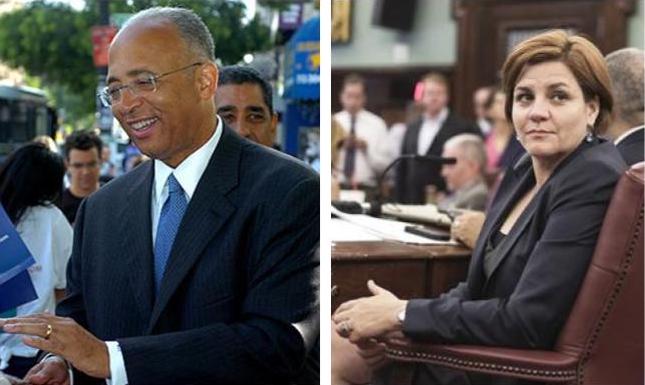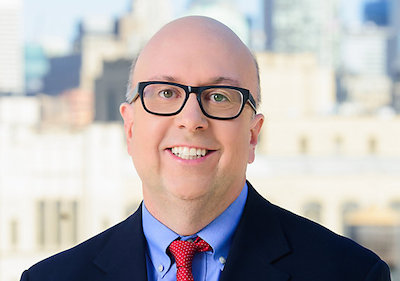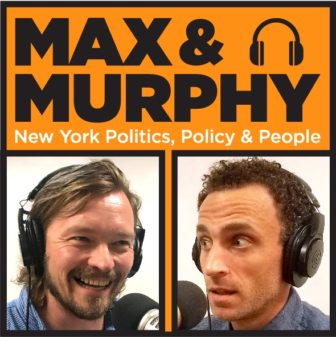Bill Thompson and Christine Quinn talk about what 2021 candidates are likely doing and feeling as the campaign enters a critical stretch. And Spectrum political chief Bob Hardt talks about preparations for the first official Democratic debate.

City Limits/NYC Council
Former Comptroller Bill Thompson and former Council Speaker Christine QuinnIt’s been a quarter century since the city’s campaign finance law was amended to require that candidates receiving public matching funds participate in televised debates. Thursday night’s Democratic mayoral debate will see the largest field ever on the Campaign Finance Board’s stage, with eight candidates sharing the spotlight.
“It’s pretty exciting and pretty surreal organizing a virtual debate. The challenge to me isn’t the technology but the number of candidates,” Bob Hardt, the political director at Spectrum NY1, told the WBAI Max & Murphy Show on Wednesday. (Spectrum NY1 is the main television broadcaster for the debate; NY1 Noticias, NYC gov TV, NY1.com, and WNYC 93.9FM/820AM will also play it).
“I don’t want this to be open mic night for these eight candidates,” Hardt told the show. “We really want to draw them out. Ideologically, they are all pretty similar, but there are real differences. That’s what the debate will show: what are their differences?”
“We will want to hear specifically: what they will do to make New York City rebound, what do they like about the de Blasio legacy and what are the things they want to change.”
Thursday night’s debate is the first of three featuring Democratic mayoral candidates. While 13 candidates will be on the June primary ballot, only eight—those who had raised above the 2021 threshold of $182,150—qualified for Thursday’s debate and a second one on June 2. Eric Adams, Shaun Donovan, Kathryn Garcia, Ray McGuire, Dianne Morales, Scott Stringer, Andrew Yang and Maya Wiley will be on the stage for those.
When New York City last had an open mayoral election, in 2013, there were seven Democratic candidates at the first debate. A second debate featured five hopefuls. Among the cast for both evenings were then-Council Speaker Christine Quinn and former Comptroller Bill Thompson, who had been the 2009 Democratic nominee for mayor.
On Wednesday’s Max & Murphy, the two talked about how they prepared for prime time.
“Some of it is just going back over facts and information to make sure that you’re retaining all of it. And then there’s debate prep—you’re going through it with other people, practicing with them and they’re going at you and hitting you with everything that they can,” Thompson recalled. The night before and the day of the debate, he said, campaigns typically pursue only a light schedule of events, so candidates can be fully rested for their time on camera.
Quinn said in her ’13 prep sessions, “We did kind of a full-on mock debate where people were the other candidates, people were the moderator, the reporters, the questioner, where I would make an opening statement and each of them would make an opening statement of whoever they were playing and they would answer the questions and I would answer the questions.”
Thompson said the prep sessions gave candidates a chance to see how they’d look on camera. “It would be filmed so people could look at you, also,” he said. “At one point someone said to me, ‘OK, stop rolling your eyes. You might have thought it was a dumb question, but stop rolling your eyes.’”
Since the pool of primary voters is likely larger than the audience that will tune in to the debates, what candidates most want to avoid is making a gaffe that becomes viral. “I didn’t wear a watch to the debate for fear of that George Bush moment where I would check my watch,” Quinn joked, “because at some point, you’re tired and are sick of standing in heels and you want to be done.”

NY1
Candidates—especially those who are less well-known and trailing in the polls–are also hoping for a break-out moment when they land a particularly good line, especially one that elicits a response from the live audience. While CFB debates in past years have not always been in front of a crowd, the audience was a key factor at that first 2013 meeting and in the 2017 debate between Bill de Blasio and Sal Albanese. But there will be no in-studio audience on Thursday, for obvious reasons.
A third 2021 debate for “leading contenders” will occur on June 10, with the sponsors setting the criteria for who gets invited to that smaller stage.
There are also two Republican mayoral debates scheduled, as well as two Democratic comptroller debates on the docket. While there is a Democratic public advocate primary, incumbent Jumaane Williams is the only candidate who meets the debate threshold, so none are scheduled. After the primary, two general election mayoral debates are on the calendar.
The CFB debates only occur for citywide offices—mayor, public advocate and comptroller—not for the borough president candidates or in City Council races. (City Limits is co-hosting a forum for the Bronx borough president candidates at 5:30 p.m. on Thursday.)
Hear our conversations with Hardt and with Quinn and Thompson below, or listen to the full show:









